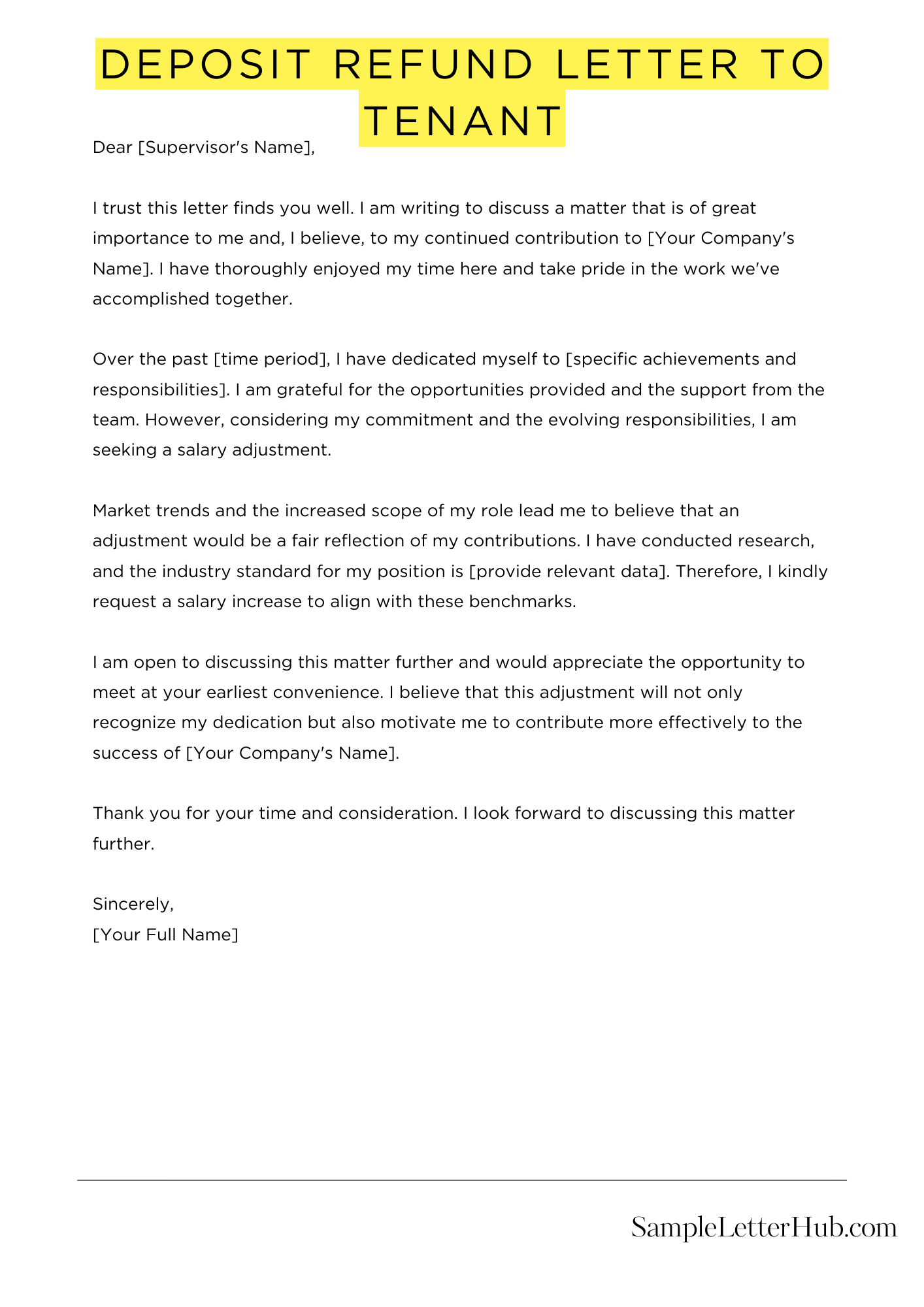A deposit refund letter to tenant is a letter written by a landlord or property manager to a tenant, informing them of the amount of their security deposit that will be refunded after they move out of the rental property. The letter will typically include an itemized list of any deductions that have been made from the deposit, such as for cleaning, repairs, or unpaid rent.
In this article, we will share some templates/examples/samples of deposit refund letters to tenants. These letters can be used as a starting point for writing your own letter, or you can simply copy and paste the text into a word processing document and make any necessary changes.
Deposit Refund Letter to Tenant
Dear [Tenant’s Name],
I am writing to inform you that your security deposit of [amount] has been refunded to you. The deposit was received on [date] and has been held in accordance with our lease agreement.
Upon the completion of your tenancy on [date], an inspection was conducted of the property. The inspection revealed that the property was in good condition and that there were no damages or repairs required beyond normal wear and tear.
As per the lease agreement, you are entitled to a full refund of your security deposit, minus any deductions for damages or unpaid rent. After deducting [amount] for [reason], your refund totals [amount].
The refund has been processed and sent to your bank account. You should receive the funds within [number] business days.
If you have any questions or concerns regarding the deposit refund, please do not hesitate to contact me.
Thank you for your tenancy. I wish you all the best in your future endeavors.
Sincerely,
[Your Name]

How to Write a Deposit Refund Letter to Tenant
**Introduction**
Deposit refund letters are an essential part of the landlord-tenant relationship. They provide a record of the security deposit and any deductions that have been made. Writing a clear and concise deposit refund letter is important to avoid disputes and ensure that both parties are satisfied with the outcome.
**Content of the Letter**
The deposit refund letter should include the following information:
* **Tenant’s name and address**
* **Landlord’s name and address**
* **Property address**
* **Security deposit amount**
* **Date of move-in**
* **Date of move-out**
* **Itemized list of any deductions from the security deposit**
* **Amount of the refund**
* **Method of payment**
**Deductions from the Security Deposit**
Landlords may deduct from the security deposit for the following reasons:
* **Unpaid rent**
* **Damage to the property**
* **Cleaning fees**
* **Late fees**
* **Other expenses authorized by the lease agreement**
**Itemizing Deductions**
When itemizing deductions from the security deposit, landlords should be specific and provide documentation to support the charges. For example, if a landlord is deducting for damage to the property, they should provide a description of the damage and an estimate for repairs.
**Amount of the Refund**
The amount of the refund is the security deposit minus any authorized deductions. Landlords should refund the tenant the full amount of the deposit if there are no deductions.
**Method of Payment**
Landlords can refund the security deposit by check, money order, or wire transfer. The method of payment should be specified in the deposit refund letter.
**Conclusion**
Deposit refund letters are an important part of the landlord-tenant relationship. By following these tips, landlords can write clear and concise letters that avoid disputes and ensure that both parties are satisfied with the outcome.
FAQs about Deposit Refund Letter To Tenant
What should a deposit refund letter to a tenant include?
A deposit refund letter to a tenant should include the following information:
- The tenant’s name and address
- The landlord’s name and address
- The date the letter is written
- The amount of the deposit being refunded
- Any deductions that have been made from the deposit
- The reason for any deductions
- The date the refund will be sent
- The method of payment for the refund
When should a landlord send a deposit refund letter to a tenant?
A landlord should send a deposit refund letter to a tenant within 30 days of the tenant moving out of the rental unit.
What are some common reasons for deductions from a security deposit?
Some common reasons for deductions from a security deposit include:
- Unpaid rent
- Damage to the rental unit
- Cleaning fees
- Late fees
What should a tenant do if they disagree with the deductions from their security deposit?
If a tenant disagrees with the deductions from their security deposit, they should contact their landlord in writing to dispute the deductions. The tenant should provide documentation to support their dispute, such as photos of the rental unit before they moved out.
What are the legal requirements for deposit refund letters?
The legal requirements for deposit refund letters vary from state to state. However, most states require that landlords provide tenants with a written explanation of any deductions from their security deposit. The letter must be sent within a certain period of time after the tenant moves out of the rental unit.

